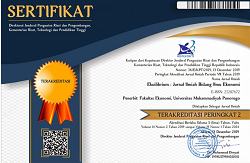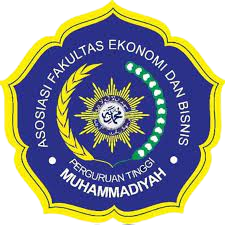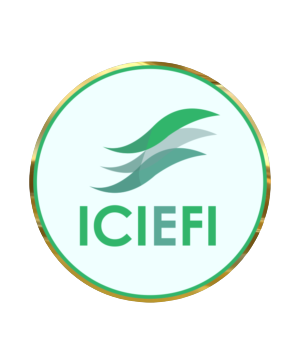Externalities of Waste Dis-amenities, Benefit Transfer Application on Piyungan and Putri Cempo Landfill, Indonesia
DOI:
https://doi.org/10.24269/ekuilibrium.v15i2.2020.pp180-187Abstract
Waste is a national problem in Indonesia. It is related to the old paradigm of waste management, which is only collected, transported, and disposed to the landfill. The same problem occurs in some big cities in Java. Landfills use open dumps, and that causes an increase in negative externalities in the quality of the environment for people who live nearby. This study aims to analyze the externalities of the Piyungan landfill. The objects of this research are the people who lived around the dump. Cost of illness and replacement cost are analysis tools to calculate the externalities. Benefit transfer is used to analyze the externalities ofthe Putri Cempo landfill in Surakarta. The benefit transfer method was developed as an alternative way to value externalities using values from studies of similar circumstances, carried out at related sites somewhere else, given the challenges and high costs inherent in assessing the actual price. Accurately, to test the performance of the benefit transfer method, this study focused on estimates of externalities associated with waste dis-amenities. The results indicate that the existence of the Piyungan landfill has a negative influence on the economic and social aspects as well as the environment of the people around it. It also happens in the Putri Cempo Landfill.
References
Dinas Lingkungan Hidup Kabupaten Bantul, 2018, Hingga 2018, DLH Bantul Telah Bangun 51 TPS 3R, Tribunjogja.com,https://jogja.tribunnews.com/2019/01/06/hingga2018-dlh-bantul-telah-bangun-51-tps-3r?
Dinas Lingkungan Hidup Kota Surakarta, 2018, Data Volume Sampah Per Bulan Kota Surakarta Tahun 2017, https://dlh.surakarta.go.id/new/?p=ss&id=436
Eshet T., Baron M. G., Shechter M., and Ayalon, O., 2006. Exploring Benefit Transfer: Dis-amenities of Waste Transfer-Stations, Environmental & Resource Economics, DOI 10.1007/s10640-006-9047-6
John Loomis, 2006, Estimating Recreation and Existence Values of Sea Otter Expansion in California Using Benefit Transfer, Coastal Management, 34:387–404, 2006 Copyright © Taylor & Francis Group, LLC ISSN: 0892-0753 print / 1521-0421 online DOI: 10.1080/08920750600860282
Krupnick, A.J., 1993. Benefit Transfers and Valuation of Environmental Improvements. Resources Winter (110): PP 1-6
Nahib, Irmadi. 2011. Mapping of Economic Valuation of Mangrove Forest Using Geographical Information System and Benefits Transfer Method: Case Study on Mangrove Forests in the ALKI II Region. Globe; 13 (1), PP.31-40
Palmer, Mark L., 2009. Assessing Benefit Transfer for The Valuation of Ecosystem Services Can Play An Important Role In Conversation Planning And Ecosystem-Based Management. Front Ecol Environ; 7(1): P.P. 38–45
Randall S. Rosenberger Tim T. Phipps, 2002, C.A. Site Correspondence Effects In Benefit Transfers: A Meta-Analysis Transfer Function, Presented at the 2nd World Congress of Environmental and Resource Economists, June 24-27, 2002, Monterey
Rosenberger, R.S., and J.B. Loomis, 2000. "Using Meta-Analysis for Benefit Transfer: In-Sample Convergent Validity Tests of an Outdoor Recreation Database." Water Resources Research 36(4):1097-1107.
-----. 2001. Benefit Transfer of Outdoor Recreation Use Values: A Technical Document Supporting the Forest Service Strategic Plan (2000 Revision). General Technical Report RMRS-GTR-72. Fort Collins, CO: U.S. Department of Agriculture, Forest Service, Rocky Mountain Research Station. 59 p. (http://www.fs.fed.us/rm/pubs/rmrs_gtr72.html).
-----. 2002, Forthcoming. "Benefit Transfer." In P. Champ, K. Boyle, and T. Brown, eds., A Primer on Non-Market Valuation. Under contract with Kluwer Academic Publishers.
Shrestha, R.K., and J.B. Loomis. 2001. "Testing a Meta-Analysis Model for Benefit Transfer in International Outdoor Recreation." Ecological Economics 39(1):67-83. 21
Smith, V.K., G. Van Houtven, and S.K. Pattanayak. 2002. "Benefit Transfer via Preference Calibration: 'Prudential Algebra' for Policy." Land Economics 78(1):132-152.
Downloads
Additional Files
Published
How to Cite
Issue
Section
License
Retained Rights/Terms and Conditions of Publication
1. As an author you (or your employer or institution) may do the following:
- make copies (print or electronic) of the article for your own personal use, including for your own classroom teaching use;
- make copies and distribute such copies (including through e-mail) of the article to research colleagues, for the personal use by such colleagues (but not commercially or systematically, e.g. via an e-mail list or list server);
- present the article at a meeting or conference and to distribute copies of the article to the delegates attending such meeting;
- for your employer, if the article is a ‘work for hire’, made within the scope of your employment, your employer may use all or part of the information in the article for other intra-company use (e.g. training);
- retain patent and trademark rights and rights to any process, procedure, or article of manufacture described in the article;
- include the article in full or in part in a thesis or dissertation (provided that this is not to be published commercially);
- use the article or any part thereof in a printed compilation of your works, such as collected writings or lecture notes (subsequent to publication of the article in the journal); and prepare other derivative works, to extend the article into book-length form, or to otherwise re-use portions or excerpts in other works, with full acknowledgement of its original publication in the journal;
- may reproduce or authorize others to reproduce the article, material extracted from the article, or derivative works for the author's personal use or for company use, provided that the source and the copyright notice are indicated, the copies are not used in any way that implies RCEPM-LIPI endorsement of a product or service of any employer, and the copies themselves are not offered for sale.
All copies, print or electronic, or other use of the paper or article must include the appropriate bibliographic citation for the article's publication in the journal.
2. Requests from third parties
Although authors are permitted to re-use all or portions of the article in other works, this does not include granting third-party requests for reprinting, republishing, or other types of re-use. Requests for all uses not included above, including the authorization of third parties to reproduce or otherwise use all or part of the article.
3. Author Online Use
- Personal Servers. Authors and/or their employers shall have the right to post the accepted version of articles pre-print version of the article, or revised personal version of the final text of the article (to reflect changes made in the peer review and editing process) on their own personal servers or the servers of their institutions or employers without permission from Universitas Muhamamdiyah Ponorogo, provided that the posted version includes a prominently displayed Universitas Muhamamdiyah Ponorogo copyright notice and, when published, a full citation to the original publication, including a link to the article abstract in the journal homepage. Authors shall not post the final, published versions of their papers;
- Classroom or Internal Training Use. An author is expressly permitted to post any portion of the accepted version of his/her own articles on the author's personal web site or the servers of the author's institution or company in connection with the author's teaching, training, or work responsibilities, provided that the appropriate copyright, credit, and reuse notices appear prominently with the posted material. Examples of permitted uses are lecture materials, course packs, e-reserves, conference presentations, or in-house training courses;
- Electronic Preprints. Before submitting an article to an Ekuilibrium: Jurnal Ilmiah Bidang Ilmu Ekonomi, authors frequently post their manuscripts to their own web site, their employer's site, or to another server that invites constructive comment from colleagues. Upon submission of an article to Ekuilibrium: Jurnal Ilmiah Bidang Ilmu Ekonomi, an author is required to transfer copyright in the article to Economy Faculty Universitas Muhammadiyah Ponorogo, and the author must update any previously posted version of the article with a prominently displayed Economy Faculty Universitas Muhammadiyah Ponorogo copyright notice. Upon publication of an article by the Universitas Muhammadiyah Ponorogo, the author must replace any previously posted electronic versions of the article with either (1) the full citation to the work with a Digital Object Identifier (DOI) or link to the article abstract in Ekuilibrium: Jurnal Ilmiah Bidang Ilmu Ekonomi journal homepage, or (2) the accepted version only (not the final, published version), including the Economy Faculty Universitas Muhammadiyah Ponorogo copyright notice and full citation, with a link to the final, published article in journal homepage.
4. Articles in Press (AiP) service
Economy Faculty Universitas Muhammadiyah Ponorogo may choose to publish an abstract or portions of the paper before we publish it in the journal. Please contact our Production department immediately if you do not want us to make any such prior publication for any reason, including disclosure of a patentable invention.
5. Author/Employer Rights
If you are employed and prepared the article on a subject within the scope of your employment, the copyright in the article belongs to your employer as a work-for-hire. In that case, Economy Faculty Universitas Muhammadiyah Ponorogo assumes that when you sign this Form, you are authorized to do so by your employer and that your employer has consented to the transfer of copyright, to the representation and warranty of publication rights, and to all other terms and conditions of this Form. If such authorization and consent has not been given to you, an authorized representative of your employer should sign this Form as the Author.
6. RCEPM-LIPI Copyright Ownership
It is the formal policy of Economy Faculty Universitas Muhammadiyah Ponorogo to own the copyrights to all copyrightable material in its technical publications and to the individual contributions contained therein, in order to protect the interests of the Economy Faculty Universitas Muhammadiyah Ponorogo, its authors and their employers, and, at the same time, to facilitate the appropriate re-use of this material by others. Economy Faculty Universitas Muhammadiyah Ponorogo distributes its technical publications throughout the world and does so by various means such as hard copy, microfiche, microfilm, and electronic media. It also abstracts and may translate its publications, and articles contained therein, for inclusion in various compendiums, collective works, databases and similar publication.
7. Licensing Terms
Ekuilibrium is licensed under a Creative Commons Attribution-ShareAlike 4.0 International License.
Permissions beyond the scope of this license may be available at https://journal.umpo.ac.id/













